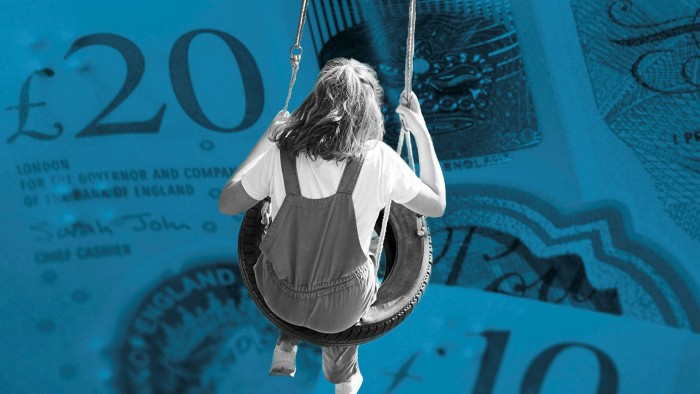‘Motherhood penalty’ made worse by the effects of the pandemic


Roula Khalaf, Editor of the FT, selects her favourite stories in this weekly newsletter.
I have a confession. I can’t seem to go for more than a few hours without talking about childcare — or our lack of it — and I’ve become even more obsessed now that the summer holidays have arrived.
Before the pandemic my husband and I, like many working parents, relied on family to help out in the holidays alongside a hotch-potch of holiday clubs, days off work and play dates. But all that changed with the Covid-19 social distancing guidelines. Ever since, we’ve been scrabbling around booking overpriced clubs and drawing up complicated childcare rotas with friends.
Every time my phone makes a sound, I rush to check it in the hope that one of my (more organised) friends will have discovered a holiday camp for the kids that is affordable, local and gets the children out of the house for more than two hours each day.
The problem for families with two working parents is that as lockdown has eased some employers are starting to bring people back to the workplace. But many children remain out of school and the few that did return are now on holiday until September.
Some families are sharing the childcare between parents, but new data show in most cases it is mothers who are bearing the brunt of the childcare — even in families where both parents are working.
The Office for National Statistics examined how parents have coped with caring for their children while working from home.
When lockdown began people had to rapidly adjust to the new normal, with school closures, parents furloughed or working from home and support from outside the home no longer available.
For millions, this included having to care for their children, including homeschooling them, while continuing to work. Some had to change their working routines to accommodate their new childcare commitments — many working parents with school-aged children said their work had been affected by the coronavirus lockdown, the report found.
In households with children aged under 18, women carried out on average two-thirds more of the daily childcare duties than men during the first few weeks of lockdown. They delivered a daily average of 3 hours and 18 minutes of childcare, which included time spent supervising children, while men contributed two hours.
The “motherhood penalty” — the impact that having children has on women’s salaries, pensions and career prospects — has been amplified by the pandemic. The ONS stats found many women were more likely to face job losses than men.
A straw poll among my network of friends, including working mothers and fathers, threw up some other factors affecting women’s finances. One friend said she had given up her high powered job in the City and went freelance when she had children, as she couldn’t get the flexibility she needed from her employer. But this meant that during lockdown her husband’s job took priority, leaving her modest income and career prospects on hold.
Another mother of two children who works for a tech company said it was noticeable how many women on her video calls had children popping in and out of the background compared with the men.
To be fair, my male friends also said it had been tricky working from home with children around — with many of them recalling situations where they had to use the “mute” button to drown out the children’s arguments. But the majority of them admitted to taking over the spare room — where they had one — as their office while their wives worked on the kitchen table (as they kept an eye on the children).
I can relate closely to the findings from another report — this time from the Institute for Fiscal Studies and the UCL Institute for Education — that found that during lockdown many working mothers were only able to do an hour of uninterrupted paid work for every three hours done by fathers.
Perhaps more worryingly, the study found Covid-19 is having a material impact on women’s finances. Mothers are more likely than fathers to have moved out of paid work, for example reducing their working hours, since the start of lockdown. The report also found that they were 47 per cent more likely than fathers to have permanently lost their job or resigned due to childcare issues and 14 per cent more likely to have been furloughed.
Experts predict the effects of the pandemic will delay the closing of the gender pay gap by decades by prolonging women’s unequal experiences in the workplace. In spite of recent progress, mothers have always taken on more of the childcare and they are the ones more likely to take time off work for children.
It is this continuous pattern in the workplace that needs to change. Fidelity International, among others, has done extensive research into the financial effects of having children on a women’s career. Its Financial Power of Women report found that for women taking a career break to bear the brunt of childcare responsibilities there is a considerable financial impact when it comes to their long-term finances.
Maternity leave is often identified as a key moment when the gender pension gap begins to widen. The research found that for every two years they have taken off work, women have to save £4.90 a day extra into their pension when they’re back at work in order to close the pension gap. Some experts have lobbied for the government to make up the contributions by topping up women’s pension pots for the months they have missed. I believe this could be a fair way to close the gap.
But even if we can’t find a quick fix for the pensions problem, something else positive can come out of the pandemic for working women. Given that homeworking has become rapidly normalised over the past five months, we now have a chance — and an obligation — to get a grip on the problems of childcare. Shining a light on the difficulties faced by working parents is the first stage along the path to a viable future for families in the post-Covid economy.
The author is FT Money’s digital and communities editor. lucy.warwick-ching@ft.com; Twitter: @warwickching
Comments